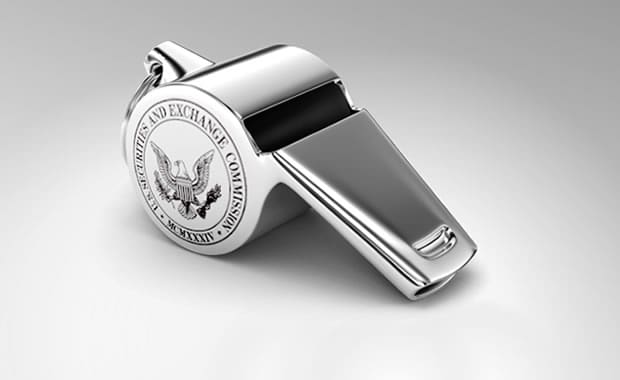Last week, John Holland of Bloomberg Law issued a critical report on the U.S. SEC’s whistleblower program. Former SEC lawyers who were responsible for the program have left the agency and would be earning millions in fees and commissions through their law firms. The program was crafted by Congress and SEC officials and gives tipsters, who report financial wrongdoing anonymously between 10% and 30% of any money the agency recovered. About 12,000 tips came in the last fiscal year.
Jordan Thomas, a former SEC assistant chief litigation counsel who helped write program rules and opened his own whistleblower practice days before it went online, represented clients who received more than $152 million of the first $600 million awarded. Attorneys typically work on contingency fees ranging from 35% to 40%, the report states.
His four new partners are all former SEC officials, including Richard Levine, the SEC associate general counsel for legal policy until 2016. Thomas said their understanding of how the agency identifies and investigates whistleblower claims helps them build cases in ways SEC officials can’t.
The agency stretches its rules at times, according to Sean McKessy, who ran the program from its inception in 2011 until 2016. He now handles SEC whistleblower cases at the law firm Phillips & Cohen, which has won awards of at least $50 million for clients since he joined. It received about $43 million when he headed the program. McKessy uses his connections to the SEC as a way to lure new clients. Former colleagues still at the SEC would ask him to send good cases their way.
Asked if that gives him an unfair advantage, McKessy said: “I’d say, probably yes. … That’s one of the reasons I think people would want me to be their counsel. They know that I’m known throughout the SEC, that I can make these phone calls.”
Washington attorney Jason Zuckerman, who represents several whistleblowers, said SEC investigators tend to turn to trusted lawyers they’ve dealt with before. “I don’t know if there is a monopoly on it, but there is credibility with people who have won a number of awards. It’s almost triage; they respond to us, and we bring only the best cases,’’ he said.
Although protecting the informants is critical, several attorneys said the SEC could do that while making more information available. That would improve the program’s impact and reputation, they said.
South Carolina attorney Richard Harpootlian, who handles False Claims Act cases, said Congress must step in because the agency has shown it can’t self-regulate.
